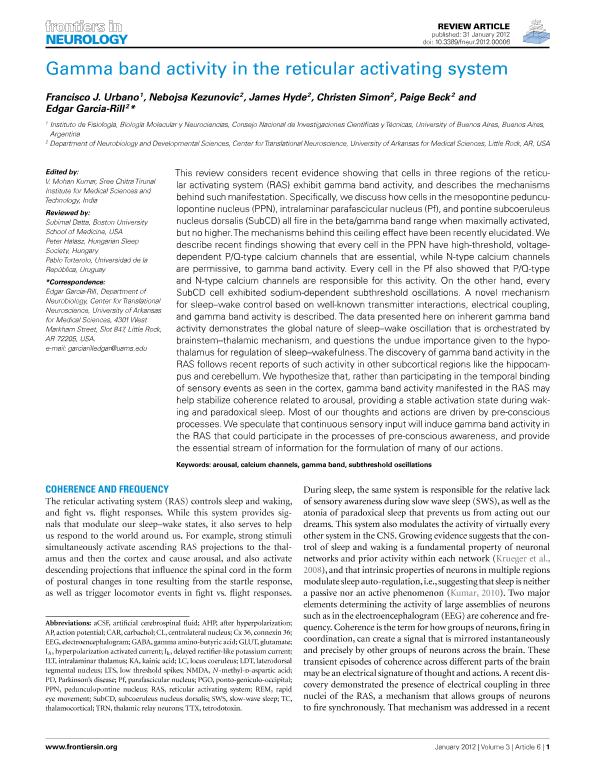Mostrar el registro sencillo del ítem
dc.contributor.author
Urbano Suarez, Francisco Jose

dc.contributor.author
Kezunovic, Nebojsa

dc.contributor.author
Hyde, James

dc.contributor.author
Simon, Christen

dc.contributor.author
Beck, Paige

dc.contributor.author
Garcia Rill, Edgar

dc.date.available
2017-07-17T21:29:28Z
dc.date.issued
2012-01
dc.identifier.citation
Urbano Suarez, Francisco Jose; Kezunovic, Nebojsa; Hyde, James; Simon, Christen; Beck, Paige; et al.; Gamma band activity in the reticular activating system; Frontiers Head Office-Online publication; Frontiers in Neurology; 3; 1-2012; 1-16; 6
dc.identifier.issn
1664-2295
dc.identifier.uri
http://hdl.handle.net/11336/20778
dc.description.abstract
This review considers recent evidence showing that cells in three regions of the reticular activating system (RAS) exhibit gamma band activity, and describes the mechanisms behind such manifestation. Specifically, we discuss how cells in the mesopontine pedunculopontine nucleus (PPN), intralaminar parafascicular nucleus (Pf), and pontine subcoeruleus nucleus dorsalis (SubCD) all fire in the beta/gamma band range when maximally activated, but no higher.The mechanisms behind this ceiling effect have been recently elucidated.We describe recent findings showing that every cell in the PPN have high-threshold, voltagedependent P/Q-type calcium channels that are essential, while N-type calcium channels are permissive, to gamma band activity. Every cell in the Pf also showed that P/Q-type and N-type calcium channels are responsible for this activity. On the other hand, every SubCD cell exhibited sodium-dependent subthreshold oscillations. A novel mechanism for sleep–wake control based on well-known transmitter interactions, electrical coupling, and gamma band activity is described. The data presented here on inherent gamma band activity demonstrates the global nature of sleep–wake oscillation that is orchestrated by brainstem–thalamic mechanism, and questions the undue importance given to the hypothalamus for regulation of sleep–wakefulness.The discovery of gamma band activity in the RAS follows recent reports of such activity in other subcortical regions like the hippocampus and cerebellum. We hypothesize that, rather than participating in the temporal binding of sensory events as seen in the cortex, gamma band activity manifested in the RAS may help stabilize coherence related to arousal, providing a stable activation state during waking and paradoxical sleep. Most of our thoughts and actions are driven by pre-conscious processes.We speculate that continuous sensory input will induce gamma band activity in the RAS that could participate in the processes of pre-conscious awareness, and provide the essential stream of information for the formulation of many of our actions.
dc.format
application/pdf
dc.language.iso
eng
dc.publisher
Frontiers Head Office-Online publication
dc.rights
info:eu-repo/semantics/openAccess
dc.rights.uri
https://creativecommons.org/licenses/by-nc-sa/2.5/ar/
dc.subject
Reticular Activating System
dc.subject
Pedunculopontine Nucleus
dc.subject
Calcium Channels
dc.subject
Gamma Band Oscillations
dc.subject.classification
Neurociencias

dc.subject.classification
Medicina Básica

dc.subject.classification
CIENCIAS MÉDICAS Y DE LA SALUD

dc.title
Gamma band activity in the reticular activating system
dc.type
info:eu-repo/semantics/article
dc.type
info:ar-repo/semantics/artículo
dc.type
info:eu-repo/semantics/publishedVersion
dc.date.updated
2017-07-12T14:52:13Z
dc.journal.volume
3
dc.journal.pagination
1-16; 6
dc.journal.pais
Suiza

dc.description.fil
Fil: Urbano Suarez, Francisco Jose. Consejo Nacional de Investigaciones Científicas y Técnicas. Oficina de Coordinación Administrativa Ciudad Universitaria. Instituto de Fisiología, Biología Molecular y Neurociencias. Universidad de Buenos Aires. Facultad de Ciencias Exactas y Naturales. Instituto de Fisiología, Biología Molecular y Neurociencias; Argentina
dc.description.fil
Fil: Kezunovic, Nebojsa. University Of Arkansas For Medical Sciences; Estados Unidos
dc.description.fil
Fil: Hyde, James. University Of Arkansas For Medical Sciences; Estados Unidos
dc.description.fil
Fil: Simon, Christen. University Of Arkansas For Medical Sciences; Estados Unidos
dc.description.fil
Fil: Beck, Paige. University Of Arkansas For Medical Sciences; Estados Unidos
dc.description.fil
Fil: Garcia Rill, Edgar. University Of Arkansas For Medical Sciences; Estados Unidos
dc.journal.title
Frontiers in Neurology
dc.relation.alternativeid
info:eu-repo/semantics/altIdentifier/doi/http://dx.doi.org/10.3389/fneur.2012.00006
dc.relation.alternativeid
info:eu-repo/semantics/altIdentifier/url/http://journal.frontiersin.org/article/10.3389/fneur.2012.00006/full
Archivos asociados
